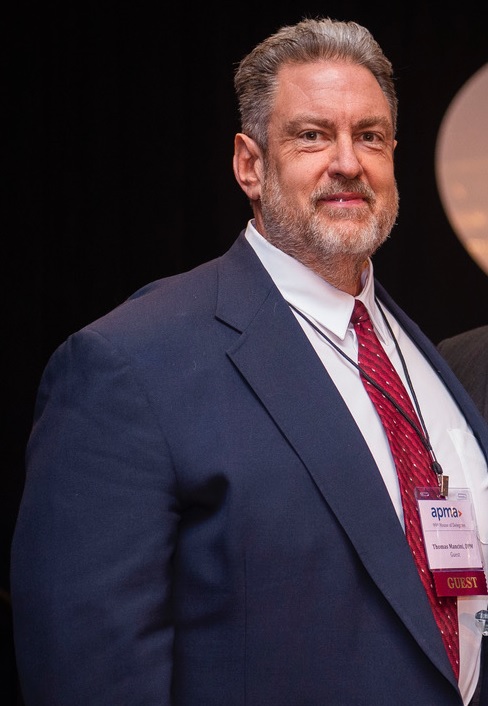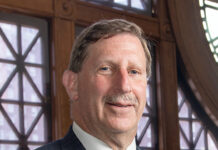
Known for his medical missionary work and as the founder of Clinics of Hope, Dr. Thomas Mancini has been dividing his time between his Rhode Island practice and West Africa for more than 15 years.
Mancini, a podiatrist, was recently presented with the 2019 American Podiatric Medical Association Humanitarian Award for his work in Togo. He, along with Debbie Motta, a nurse and colleague, founded Clinics of Hope in 2004. A Clinics of Hope Foot Health Center is set to be opened in Togo’s capital in the fall of 2020 to focus on diabetic foot care, limb salvage and tropical ulcers.
Mancini has also served as medical team leader for the Haiti Charity Hope Foundation, and as a volunteer with Rhode Island Free Clinic. He is scheduled to speak about Clinics of Hope and his work in Rhode Island at the Surgical Pearls by the Sea conference in Newport on April 27.
PBN: What took you to Togo in 1998, and what did you see there that prompted you to keep returning and eventually found Clinics of Hope?
MANCINI: My church, New Hope Christian Church in Swansea, began supporting Pioneers-Togo prayerfully and financially in 1993. The director in Togo invited members of our church to come and see the fruits of this work. He asked for medical volunteers to aid many people in need. Pastor Dave Therrien helped motivate me to go.
Two events prompted me to continue. After waiting eight-plus hours in a crowd of more than 800 people – we were only able to see about 80 of those waiting – a man approached me as we were packing up. He had a cataract, and I told him we did not have an eye physician. He was so happy just to have talked to someone that he dropped down and hugged my ankles in thankfulness! To him, just the explanation and moment of my time was valuable.
We had a patient named Nafa who was HIV-positive. She was close to death; we treated her for severe dehydration and malnutrition and did our best to ease the pain of her many complications. With food and hydration, she felt a bit better and was able to get up, stand, walk a bit and prepare some food for her husband, Ladjombe, and baby. She woke up late one evening and awoke her fellow villagers and asked them to sing and dance and celebrate with her. She returned to bed after a short time and died. Her husband and the village were overwhelmed by our love and caring but mostly by the fact that Nafa was happy and wanted to dance and celebrate so close to her death. She had found peace and hope.
I realized that simple medical care could prevent ulceration, infection and even permanent loss of function and death, and I was compelled to help. Finally, and most importantly, as a Christian I have a strong faith in the eternal life that Jesus promised for those who believe in Him. I believe that my service to those in need in Togo is a part of God’s plan for my life. In an environment [such as] Togo, where disease, death and suffering are rampant, continuous sharing of this hope is powerful to me.
PBN: How many Clinics of Hope are in West Africa now, and how many patients seek treatment there each year?
MANCINI: We have seven full-time clinics in Togo, West Africa. Six are “in the bush,” with solar power only, shallow, dug wells, latrines and no running water. Our main clinic is in the city of Sokode – population 200,000. This clinic has a lab, X-ray, ultrasound, five inpatient beds, internet, electricity, running water and full sanitary facilities. The clinics in the bush see 100 patients a week; Sokode sees about 200. In the six clinics in the bush, all pregnant women get perinatal care, including labor and delivery.
PBN: How has Clinics of Hope been able to partner with other health care organizations, and how have patients benefitted?
MANCINI: The Rhode Island Podiatric Medical Association has been instrumental in providing finances, equipment, supplies, and assistance in marketing and promoting our clinics. We are actively working with the Rhode Island Podiatric Medical Association to develop a Foot Health Center of West Africa in Lome, the capital of Togo. Residents from Kent Hospital and Roger Williams [Medical Center] have expressed interest in providing state-of-the-art foot and ankle medicine and surgery there once this center is open.
Bay Community Baptist Church and New Hope Christian Church, both in Swansea, each sponsor a clinic. We also receive prayerful and financial support from Apponaug Pentecostal Church and the two R.I Chapters of Full Gospel Business Men’s Association. We also buy medicines at a reduced cost from Blessing International, and receive donations and supplies from numerous local physicians, surgery centers and wound care centers.
We maintain a network of specialists who are willing to review cases and consult via email, telephone, etc., while we are in Togo or if our full-time staff needs assistance. All medical specialties are represented, [including] cardiology, gastrointestinal, hepatology, physical therapy, urology, endocrinology, and more.
Recently we consulted on a newborn with a urinary tract problem, a child with liver failure from hepatitis and a teen with avascular necrosis of the hip. As a podiatrist, I receive many photos, updates, X-rays and lab results from patients with foot and ankle problems.
We partner with Love the Children, a ministry of New Hope Christian Church, to care for 65 orphans in our villages; we also put drilled, deep-water wells in some of our clinic villages through Water for Life, also a ministry of New Hope Christian Church. We also work with Pioneers-Togo to assist village chiefs and elders with village-development issues such as church planting, school building construction, supplies, furniture, sign painting and placement, solar lighting projects, literacy training and constructing athletic fields.
PBN: What are some of the most common health problems treated at the clinics?
MANCINI: Speaking as a podiatrist, we see a lot of lower-extremity wounds and trauma and infections, especially bone infection. There are many debilitating skin infections that adversely affect patients of all ages. Most of these are only found in tropical climates and do not occur in the U.S. We treat many patients with malaria, malnutrition, diarrhea, dysentery, upper-respiratory infections and pneumonia. Our clinic’s staff takes care of women throughout pregnancy with screenings, checkups, ultrasounds, vitamins, and labor and delivery.
PBN: Are patients able to obtain care even if they cannot pay?
MANCINI: When there is a team from the U.S. seeing patients at our clinics several times per year, all patient visits, surgery, care, supplies and medicines are free to everyone that we see. Often in these clinics, we will care for more than 600 patients a day, depending on the number of medical providers. Daily our clinics see patients for a minimal cost of about 25 to 50 cents per visit. Medicines are sold at cost, plus 10%. No one is refused care for any reason. If someone cannot afford the care, it is free.
Often our staff seeks out people in the village who are sick and brings them to our clinics to care for them before the problem progresses. Often, we will pay for more-advanced medical care that is necessary, such as C-sections, hernia repair, cataract surgery, leg and back braces, and physical therapy depending on the circumstances and available funds.
Elizabeth Graham is a PBN staff writer. Email her at graham@PBN.com.












